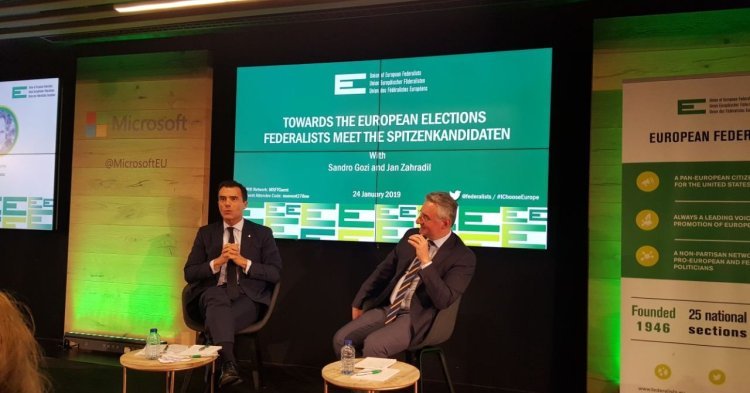Even though Jan Zahradil is a Europarty’s lead candidate, he only wants to enter the Commission on the European Council’s agreement. From the start of the debate, Zahradil was clear: the EU has always been a mix of federal and intergovernmental aspects, and he would like to see more of the latter. When the moderator Chris Burns asked if it’s the European Council that decides on the Commission president anyway, Zahradil’s response was “I hope so”. [1]
Single Market and “a Europe of free choice” as points of agreement
As differences between the ‘hard core’ of European integration and more Eurosceptic member states are increasingly clear, the debate on a ‘multi-speed Europe’ where different countries can integrate at a different pace is timely. Sandro Gozi calls it “a Europe of free choice”: if there is a willing group of countries that want to move further, he cannot accept one country saying ‘no, you cannot do that’. Jan Zahradil agreed, saying he would be happy with a multi-speed EU.
Both of the two also agreed that the Single Market should be completed. Indeed, this is at the core of the European Conservatives and Reformists’ vision of Europe. Speaking to EurActiv in the autumn, Jan Zahradil said that while the party disagrees with things such as a common foreign policy, they are clear that the EU has brought many benefits, including the Single Market.
With a strong budget, the EU could tackle economic crises occurring within its single market. However, on questions of budget the federalist and the conservative differed. When Sandro Gozi spoke about ‘own resources’ for the EU budget, such as a digital tax or carbon tax, and about a specific Eurozone capacity to provide investment, Jan Zahradil said that his views were “99% to the contrary”. “I wouldn’t like to pay more taxes”, he said. Advancing his argument for “taking back control” of a changing world, UEF’s Sandro Gozi retorted that he just wants multinational corporations to pay theirs.
Competing track records of federalism and intergovernmentalism
Interestingly, Jan Zahradil favours the Single Market and the four freedoms, while at the same time being reluctant to more integration in other areas (such as defence, military, asylum and migration policies), as he would rather trust an intergovernmental approach. But the Single Market is one of the most successful achievements of the EU, and it is not based on an intergovernmental model, but on a federalist one. To echo one of the audience questions, why not apply this model, which has proved to work, in areas where the intergovernmental model has proved to fail?
Jan Zahradil criticised the federalists’ “underestimating” of the national level, as he didn’t see why he wouldn’t trust sovereign States to commit to respecting an agreement they signed, taking the example of the Paris Agreement. But as Sandro Gozi answered, Visegrád countries did not respect the Treaty of Lisbon with regard to migration and asylum policy, whereas they signed and ratified it, and that it was too easy to sign and ratify a Treaty and then break with one’s commitments when the reality strikes. Sandro Gozi also argued that the Paris agreement was a success thanks to the EU incentives. Finally, we can add that it appears difficult to trust (all) states in respecting their engagements regarding the Paris Agreement, as Donald Trump announced that the US will withdraw from the Agreement.
Disagreement on European solidarity and migration policy
The discussion became more heated when the question of solidarity arose. The two panellists had a different idea of solidarity. For Zahradil, solidarity is a ‘common will to help each other in hard times’, but it cannot be “asked for or imposed” by a majority vote. Gozi, for his part, pointed to the numerous mentions of solidarity in the EU treaties – in joining the EU, one agrees to solidarity, and so one cannot pick and choose on a daily basis. At the same time, Sandro Gozi reminded that it’s always possible to even leave the EU altogether, so long as one is prepared to bear the costs.
The question of solidarity was related to migration and asylum policy. The Italian Sandro Gozi challenged the Visegrád countries – including Jan Zahradil’s native Czech Republic – for not showing solidarity in helping handle the so-called migration crisis, whilst taking in EU cohesion funds. In a compromising tone, Zahradil floated a scheme where Visegrád countries could agree to some reduction of cohesion funds, with the money instead being spent on border control.
For Zahradil, asylum policy should be at the national level, as for him the right to grant or deny asylum is an important attribute of statehood. Throughout the debate, the conservative lead candidate was open about the core principles that guide his vision of Europe. A federalist might disagree, but it was never hard to see where Jan Zahradil was coming from.
Jan Zahradil criticised Commission President Jean-Claude Juncker’s proposal to have 10,000 more Frontex border guards, saying that this budget should instead be allocated to reinforcing the national capacities of the states directly concerned by migrant arrivals (Greece, Italy, Spain), arguing to they better know the situation than a disconnected EU agency. He also implied that Frontex border guards would mean that the national level would be powerless, which does not appear correct, as Frontex does cooperate with and rely on the states’ capacities and experience on the ground. To say that Frontex border guards act independently and regardless of the national ones would be a misunderstanding. As Jean-Claude Juncker stated, the European Border and Coast Guard should be implemented to be “ready to support the over 100,000 national border guards in their difficult tasks”, not to replace them.
Two visions of Europe, one ballot box
Another argument that Zahradil presented against a common asylum policy is that asylum policy can’t be separated from questions of aid to migrants, and thereby social policy. This, in turn, is difficult because some EU member states are wealthier than others, and ‘convergence will take generations’. In general, without this convergence, the EU cannot be a federation, Zahradil said. When a federalist in the audience asked why the EU can’t unite, if Italy with its sharp regional differences can, Jan Zahradil said the difference is that Europe isn’t a nation. [2]
Ultimately, the question is about how far your deep sense of belonging extends: up until the national borders, to the edges of Europe, or perhaps beyond. Federalists presented their view, and the Conservatives and Reformists’ Jan Zahradil presented his – in May, it’s up to the people to express their preference.



Follow the comments: |
|
